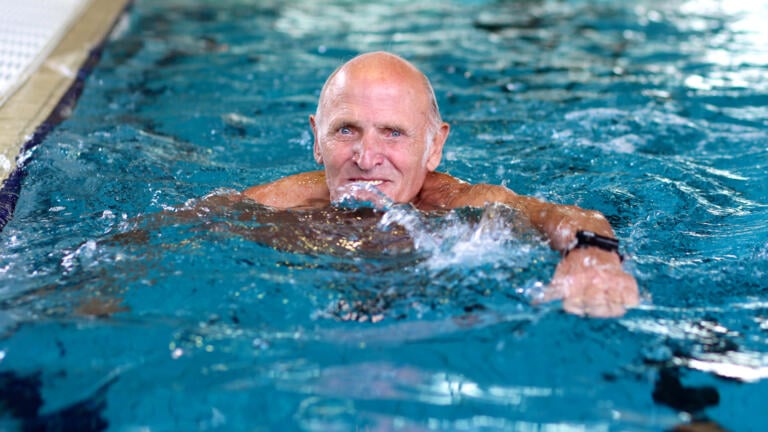
12 reasons why swimming is good for you
Julie Penfold
Exercise can be enjoyed at any time of day, but a lot of people like to get moving first thing. Whatever your choice of workout, is there an added benefit to doing it before you eat?
Whether you’re a night owl or an early riser, a lot of us like to get moving soon after waking. That might mean taking the dog for a walk, or maybe you head to the gym to exercise before work. Other people prefer a lunchtime run or heading to an exercise class in the evening. But what are the benefits of fasted cardio?
Fasted cardio is a popular search term, with people trying to establish whether you’re better off eating before a workout or not. As with most exercise-related questions, the answer is more nuanced than a straight yes or no. Is fasted cardio better for you? We break it down.
Whether you’re a night owl or an early riser, a lot of us like to get moving soon after waking. That might mean taking the dog for a walk, or maybe you head to the gym to exercise before work. Other people prefer a lunchtime run or heading to an exercise class in the evening. But what are the benefits of fasted cardio?
Fasted cardio is a popular search term, with people trying to establish whether you’re better off eating before a workout or not. As with most exercise-related questions, the answer is more nuanced than a straight yes or no. Is fasted cardio better for you? We break it down.
 Credit: Shutterstock / Monkey Business Images
Credit: Shutterstock / Monkey Business Images“The term fasted simply means doing something on a stomach that has processed all its food, so training on an empty stomach in the case of fasted cardio,” Tim Harris, personal trainer and fitness coach at Goldster tells us.
For most of us, this would mean working out first thing after waking, before breakfast. However, if you practise intermittent fasting, you might not break that fast until lunchtime or later, so your cardio exercise might happen late morning or even early afternoon.
Intermittent fasting is when a person has one eating window and one fasting window in a 24-hour period. Popular intermittent fasting schedules are 16:8 or 14:10. This might look like fasting for 14 hours, from 8pm to 10am, and eating all your meals between 10am and 8pm.
Fasted cardio is safe if you’re not exercising at too high an intensity. If you regularly run 5km (just over three miles), for example, or swim 40 lengths at 6am, your body will be able to do this in a fasted state. However, if you decide to try a HIIT class (high intensity interval training) for the first time without eating breakfast, you might find yourself feeling a bit light-headed.
Any form of endurance cardio should also be avoided in a fasted state – don’t run a marathon on an empty stomach, basically.
Fasted cardio can be beneficial for those who practise intermittent fasting. Instead of trying to fit a workout in during your eating window you can exercise while still in your fast, breaking it with a post-workout meal. This is particularly helpful if your eating window is short, or you don’t have much time available during the day.
Some people – whether they fast or not – feel sluggish if they eat before exercising. If that’s you, fasted cardio might be a better choice. Similarly, if you often battle nausea when working out you might find it more beneficial to exercise on an empty stomach.
Early morning exercisers might also benefit from fasted cardio simply because they don’t have to get up so early. If you run at 5.30am but want to eat beforehand that could mean setting an alarm for 4.30am or earlier, but with fasted cardio, you can roll out of bed and get going.
As Harris points out, though: “Ultimately, any cardio fitness is beneficial for heart health and fighting various heart related diseases.” The benefits of cardio include better heart and lung function, lower blood pressure and cholesterol, enhanced brain health and more, making it an excellent choice of exercise whether fasted or not.
 Credit: Shutterstock / Ground Picture
Credit: Shutterstock / Ground Picture“There is some evidence that training in a fasted state helps you burn more fat during the immediate activity, but burns less as the day goes on,” Harris tells us.
“Similarly, if you eat your relevant meal and train as and when you’re ready, your body will burn more of the fuel from the food than it will fat stores. This may result in having more energy to complete your cardio session but may result in slightly less immediate fat being burnt off.”
Over a 24-hour period, the difference between fasted or non-fasted cardio for fat burning is negligible. However, fasted cardio does burn more fat during the workout itself. This is because our bodies have less glucose as a result of the fast, forcing the body to use fat stores for energy when exercising.
If we eat before a workout, the body uses that food (converted into glucose) for fuel instead. But don’t forget that our bodies carry on burning fat for fuel throughout the day – especially if we add strength training into the mix.
“Fat loss is a byproduct of continuous CV (cardiovascular) fitness but can actually be less effective than resistance training for fat loss,” Harris points out.
Although the science says there’s not much difference between fasted and non-fasted cardio, weight loss may be helped by fasted cardio in an indirect way. Exercise can make us hungry, and that might mean we end up eating more.
For example, if a person wants to eat before they go and run five miles at 8am, they might have a bowl of porridge. The carbohydrates will give them energy to complete the run. But if they come home, and find themselves hungry again by 9:30am, they might then have eggs on toast to keep going until lunch. If exercising in a fasted state, they would only have the eggs and toast.
In this sense, fasted cardio could contribute to weight loss, as ultimately the only reliable and scientifically proven way to lose weight is to create a calorie deficit. This means burning more calories than you take in each day.
For some, this might look like making more healthy eating choices at each meal, or else upping the amount of exercise you do each day.
 Credit: Shutterstock / Gorodenkoff
Credit: Shutterstock / GorodenkoffAs already discussed, fasted cardio doesn’t provide any major safety concerns, provided you don’t suddenly try to do a mammoth exercise session having not eaten for 16 hours. But working out too intensely in a fasted state may limit muscle growth by forcing the body to break down protein in muscle and convert it to glucose for energy.
This is not something we want as we age. Our muscle mass declines faster after 30, and we need to preserve or even build muscle to prevent many health conditions such as sarcopenia (loss of muscle) or osteoporosis. We also need our muscle mass to preserve mobility and flexibility.
One way to avoid this but still be able to do fasted cardio would be to keep the fasting window relatively short, such as 14 hours, to ensure our bodies have enough energy on hand.
Fasted cardio may also affect performance in a workout, especially if you’re new to exercising on an empty stomach. It can feel harder, and that might result in you feeling dizzy or unwell, so be careful not to push too hard. Gentle, steady-state cardio such as yoga or walking are good choices.
With very little scientific difference between fasted and non-fasted cardio, it all comes down to personal preference. The important thing is to reap the benefits of exercise, however and whenever that may be.
“The long and short of it is, do what works for you,” Harris says. “Some people love to get up at 6am and run or swim, for example, with zero food in their bodies. Others prefer to have a good lunch and perhaps run two hours after their meal.
“Depending on you and how you like to train, cardio with or without food in the body is a winner, it just depends on the individual. At the end of it all, cardio is great for heart health and releasing endorphins to make you feel good. Combining cardio and strength training, however, will ensure fat loss, muscle and heart health, and a happier, more balanced mind state.”

Written by Becky Fuller she/her
Published:
Becky Fuller is a fully qualified Personal Trainer, specialising in strength and conditioning for over 50s. Becky’s focus is helping people to become stronger both in body and mind, and to move well without pain. Becky also has many years’ experience working as a freelance journalist, writing for a wide variety of publications such as Screen Rant, Geek Feed, and Daily Actor. She also regularly reviews theatre productions for UKTW.